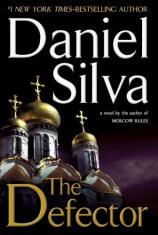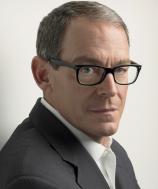Author Talk: July 24, 2009
March 8, 2002
As a former foreign correspondent and CNN producer, when Daniel Silva stepped into the fiction arena, he brought a fresh new perspective to the espionage thriller. THE ENGLISH ASSASSIN, like his other novels, is more than just a suspenseful story woven into a rehashed history. He creates characters that are riveting and empathetic, that engage the reader in some personal soul-searching as well. In this recent interview with Bookreporter.com's Ann Bruns, Silva reveals his personal theories on heroes and villains, and the unfortunate realities of life in the international spy game.
TBR: As events unfolded in THE ENGLISH ASSASSIN and the morality of personal and political actions was examined, I was reminded of the old adage "Things are not always black and white." Did you have that concept specifically in mind when you began writing this novel?
DS: I try to adhere to that "old adage" with every book I write. Heroes with no personal flaws are cardboard and boring, as are villains with no redeeming qualities. I often consciously attempt to blur the lines between villains and heroes; to assign to each qualities usually reserved for the other. In the first book of the Allon series, THE KILL ARTIST, the Palestinian terrorist Tariq was a somewhat sympathetic character. He had a compelling backstory. His family had suffered terrible indignities. If he had been a raving madman, the book would probably have lost some of its resonance.
TBR: Your depiction of Gabriel Allon, the art restorer and Israeli assassin, as well as others who assist him, are fairly sympathetic characters. Is there a part of you that accepts the Gabriel Allons of the world as inevitable? Even justified?
DS: I believe that democracies have a right --- perhaps even a duty --- to protect their citizenry from terrorist attacks. As we have seen from our own experience, it is oftentimes necessary to take the battle to the terrorist. To engage him on his battlefield. Indeed, to terrorize the terrorist. Because Israel was struggling for her very existence, her leaders understood this long before we did. But when inherently decent countries resort to these tactics --- when they climb into the gutter with the terrorists --- there is often a terrible price to be paid. Britain is certainly scarred from its secret war with the IRA. So, too, is Israel. The terrorists make us behave in ways we would rather not. Gabriel would rather be a painter than an assassin. Terrorism took that from him. I view Gabriel sympathetically, but I do not envy him. In many ways, I feel terribly sorry for him.
TBR: Switzerland is, without question, the central villain of THE ENGLISH ASSASSIN for its past financial affiliations with Hitler and the Nazi looters. Is the Swiss government's continued secrecy about, and denial of culpability in, these events an ingrained response or evidence that its financial institutions are still masters of manipulation?
DS: During the research for the book, I spoke to a man who was the president of a Swiss bank. He gave me a piece of advice that I used to sharpen my thoughts about Switzerland. "What you have to understand," he said, "is that Switzerland is a business and it's run like a business." I loved the line so much that it eventually made its way into the book. If you use that premise as a starting point, many aspects of Swiss history come sharply into focus. The Swiss cooperated with Hitler because it was good business, and now they are attempting to limit exposure of that crime because it would be bad for business. Switzerland is a country with few natural resources, yet per capita it is the second-richest in the world. The men in Bern and the bankers of the bankers of the Bahnhofstrasse are going to protect that at all costs. The villains of THE ENGLISH ASSASSIN are a group of bankers, industrialists and intelligence officers called the Council of Rütli. They are wholly fictitious, but in my opinion, not very far from the truth. Clearly, the Swiss government and Swiss business have worked together to hide the sins of the past or put a more favorable veneer on them. That collusion continues to this day.
TBR: Gerhardt Peterson's role in THE ENGLISH ASSASSIN is the secret service official with connections to the bankers involved with the art looting. Although he is primarily motivated by greed and power, there is a personal history that might leave readers wondering if there is more to Herr Peterson than meets the eye. Were you tempted at some point to take this character even farther than the present storyline?
DS: I liked Peterson very much, but I didn't want him to grow to the point where he crowded out Gabriel and Anna and the assassin. Having said that, he is still a terribly important character, even though he moves through the background of the story until the climax. Allegorically, he represents that segment of Switzerland that struggles to place the past in perspective. He enjoys the benefits of Swiss wealth and influence --- indeed, he struggles to attain more of it --- but at the same time he is haunted by the actions that helped produce that great wealth.
TBR: Although your sources for background material on Swiss law enforcement remain anonymous, how did you manage to find anyone who would give you information in the first place?
DS: Persistence and good fortune.
TBR: The fictional assassin of the title is an interesting character both in terms of his background and his code of behavior --- not entirely the cold-blooded, killing machine that readers might expect. Is he based on any real person in particular? Do you see his characterization as more the norm than the more sensationalized real-life assassins like Carlos The Jackal?
DS: Not really. Christopher Keller is truly cut from whole cloth: a former British special forces officer who lives on the island of Corsica and kills people for a living. I've always been fascinated by Corsica and its history of feuding and bloodletting. It was fun to place an outsider like the Englishman in that setting.
TBR: Anna Rolfe spent a lifetime tormented by her relationship with her father. On the one hand, her mother's death created an irreparable gulf between them yet, at some point, she was entrusted with the secret of his hidden collection. Why would she have continued to protect him, feeling as she did about his past activities?
DS: It's not terribly unusual for wealthy collectors to conceal parts of their holdings. Anna knew her father concealed part of his collection but she didn't know --- or perhaps she chose not to know --- how he obtained those paintings. But when her father was murdered, it spurred Anna forward to finally learn the truth about her family and its tragic history. Interestingly enough, she has to turn to an Israeli agent to help her do that.
TBR: All of your novels, beginning with THE UNLIKELY SPY, have been rooted in historical events to an extent, but THE ENGLISH ASSASSIN seems to have more of a journalist's viewpoint woven into it than the others. Did you set out to write a thriller and then find yourself wanting to dig into the story behind the stonewalling to recover the looted art instead?
DS: I set out first and foremost to write an entertaining and thought-provoking thriller. But I also felt it was necessary to create plausible circumstances by which a Swiss banker could acquire a substantial collection of French Impressionist paintings. Doing that required me to delve into the past. I tried to dramatize that information rather than recite it, and I think anyone who reads the book will ultimately learn something about a terrible chapter of the Second World War.
TBR: Do you feel the Independent Commission of Experts formed by the Swiss government to investigate the accusations about Switzerland's role in the Nazi looting was merely a token gesture? Have there been any recent indications that the Swiss government is willing to assist in restoring the looted art to its rightful heirs?
DS: (((I think the third Q&A deals well with this one)))
TBR: Clearly your background as a foreign correspondent and as an executive producer with CNN in Washington has to be tremendously advantageous in developing your novels. Will you be writing any nonfiction books in the future, or do you find it's more fun to work in a fictional world for a change? Or perhaps, given your vast experience in Washington circles, I should ask if there's much difference?
DS: No way! I'm having way too much fun writing fiction.
TBR: Why do you think after all these years and the wealth of historical events that have followed, stories of World War II and the machinations of the Nazis still remain the most popular topic of international thrillers?
DS: Because the Nazis were the "villains" of the twentieth century. They committed crimes of unimaginable proportions, and we live with the scars of those crimes today. I tried to keep this story small in scale --- you won't find any fanatical Nazis dreaming of a Fourth Reich in this novel --- and I think it's a bit more poignant as a result.
TBR: There have been comparisons made between your novels and Tom Clancy's, ever since THE UNLIKELY SPY hit the bestseller lists. I tend to think your writing is more in the arena of the espionage masters, Robert Ludlum and John Le Carre. Who would you consider your mentors to be?
DS: I've been influenced by writers ranging from Le Carre to Jack Higgins, from Eric Ambler to Graham Greene. I think of myself as being a bit old-fashioned in my approach to storytelling and the style of my prose.
TBR: With its topical content and wonderful characterizations, THE ENGLISH ASSASSIN would seem the perfect novel for Hollywood. Have you been approached about a film version?
DS: Not yet, but fingers are firmly crossed.
TBR: Do you have another novel already on the drawing board? Will we be reading more of Gabriel Allon in the future?
DS: I'm working on the new book now, and I think there's a pretty good chance that Gabriel Allon will be in it.
© Copyright 1996-2011, Bookreporter.com. All rights reserved.




